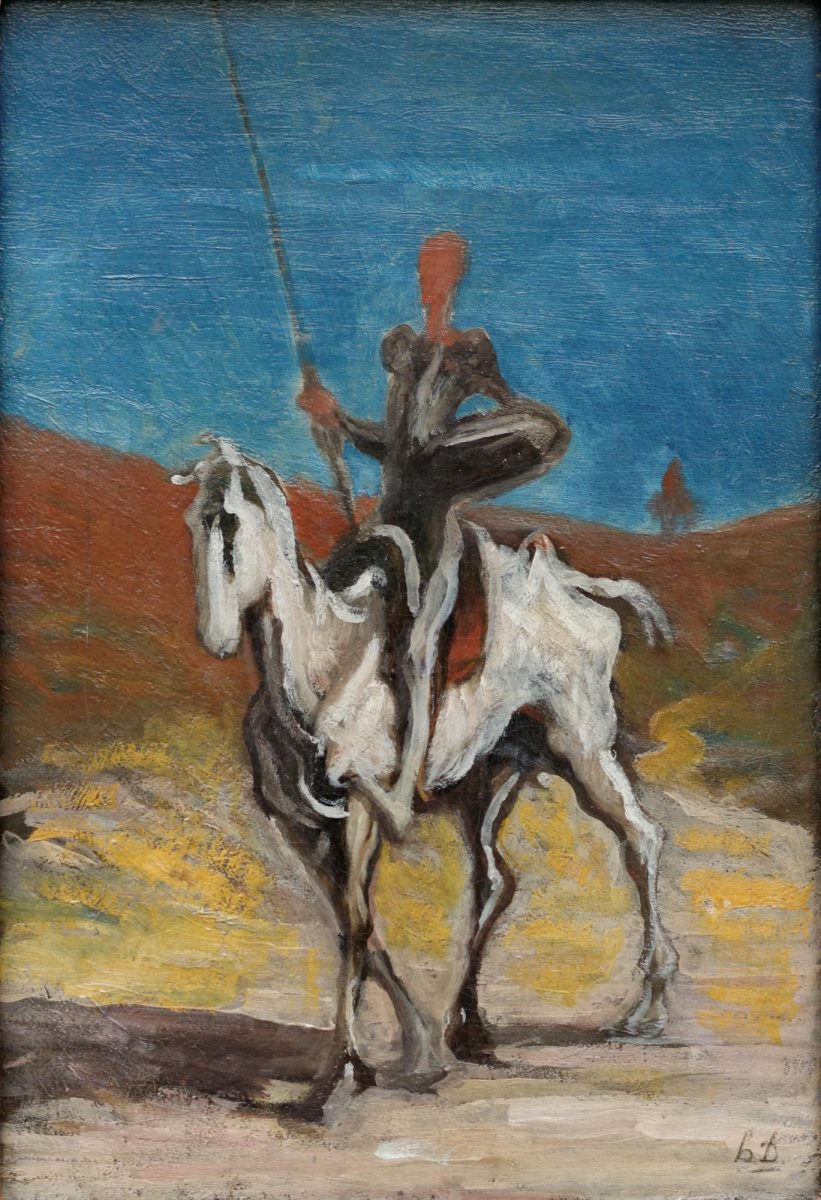The knight of the sorrowful figure has anemic and wound-bitten bones covered by a suit of armor more rust than iron, and more decoration than defense. Appropriately, he rides a horse by the name of Rosinante whose skin clings to its bones. This knight is Don Quixote of De la Mancha, once called Quixana.
When he was Quixana he lived a mundane life in Spain during the 19th century with his niece and housekeeper. He owned a patch of farmland that was tended to by a hired servant. The only excitement in Quixana’s life came from the knightly stories that he found himself engrossed in day and night, which came to his detriment.
One fateful day, the tall tales overrode Quixana’s mind and he could no longer distinguish them from reality. This caused him to take up arms as Don Quixote, believing himself to be a knight and traverse Spain in search of adventure to rival that of his stories. However, this often manifests itself as whimsical and haphazard encounters that further deteriorate both his mind and body. Quixote’s adventures include attacking windmills that he mistook as giants, fighting random travelers trying to mind their own business and attacking herds of sheep thinking they were warring armies.
As a lover of mostly sci-fi and mystery, I’m not too often exposed to comedic writing in books, but this story was full of it. Every new chapter in Quixote’s journey felt like the punchline to a joke that author Miguel de Cervante meticulously set up. Cervante wanted readers to laugh at the pseudo-knight’s failures and it worked. I found myself pausing while reading just so I could sit back and laugh at Quixote’s latest antics. He’s a jester in rusted armor who never seems to run out of jokes.
By far the most formidable of his exploits is the glorious battle against the windmills. Quixote, of neither sound mind nor body, and his sidekick, Sancho, engage several towering windmills in a deathmatch. Obviously, the battle was lost, and Quixote was violently flung several feet by the windmill. How does he explain this defeat? Sorcerers used magic to switch the giants out with windmills just as he attacked them.
Whether he’s trying to topple over windmills or free fake princesses, the first half of Quixote’s story is drenched in comedy. Despite the many perilous situations Quixote found himself in, the story still managed to be lighthearted – it doesn’t stay that way moving into its second half. At this point, the character hadn’t significantly changed but the way that I perceived him did.
I began to see Quixote as so much more than just a running gag to invoke laughter from me. He is a deeply troubled man who detests his reality so immensely that he chooses to live in an entirely fictional one to escape. Quixote’s disposition no longer felt like a comedic device, but an insidious illness that had wrapped itself around his life and swallowed it. More worrisome is that he showed no signs of improving, only plummeting further into the malleability of his mind.
Consequently, his new adventures evoke sadness in me because I see them for what they truly are. Quixote’s exploits are not comedy, but cries of a man trapped in the madness of his mind, so far submerged that no one can reach him. The second half finds him freeing lions to fight them and spelunking in caverns for any sign of adventure, both of which leave him fruitless. The lions were too bored to fight him and he passed out in the cave. His dissatisfaction with life intertwines with delusion to devalue his very existence. Friends and family alike have attempted to wrestle Quixana from Quixote to no success.
The only human connection that Quixote has left is squire, Sancho, who has pledged to follow him for life. Sancho is heartbreakingly aware of his master’s disposition and has met harm several times because of it. Sancho is regularly attacked by those his master has displeased, but despite this, sticks with Quixote because he knows that there is a good person underneath the mad exterior. In his heart of hearts, Quixote truly does want to do good for people and Sancho is the only person who can recognize that innate goodness even if it does not work out most of the time.


